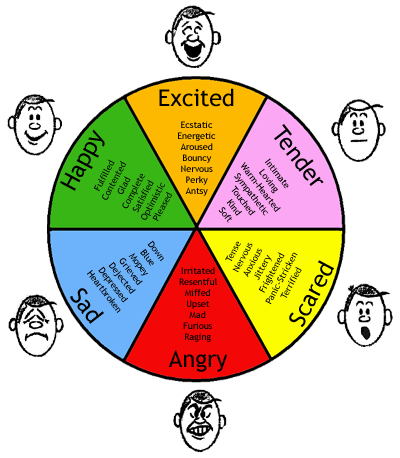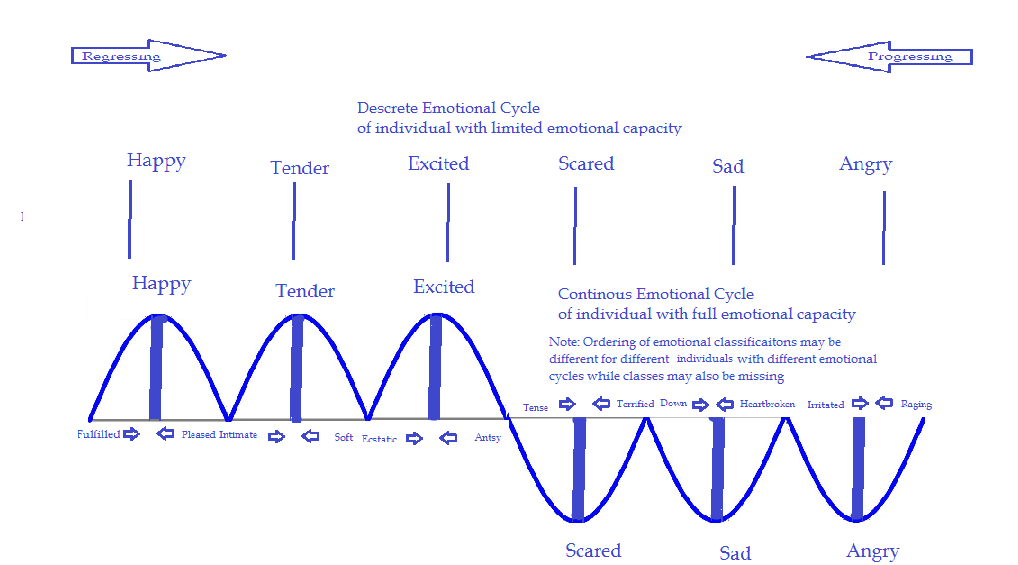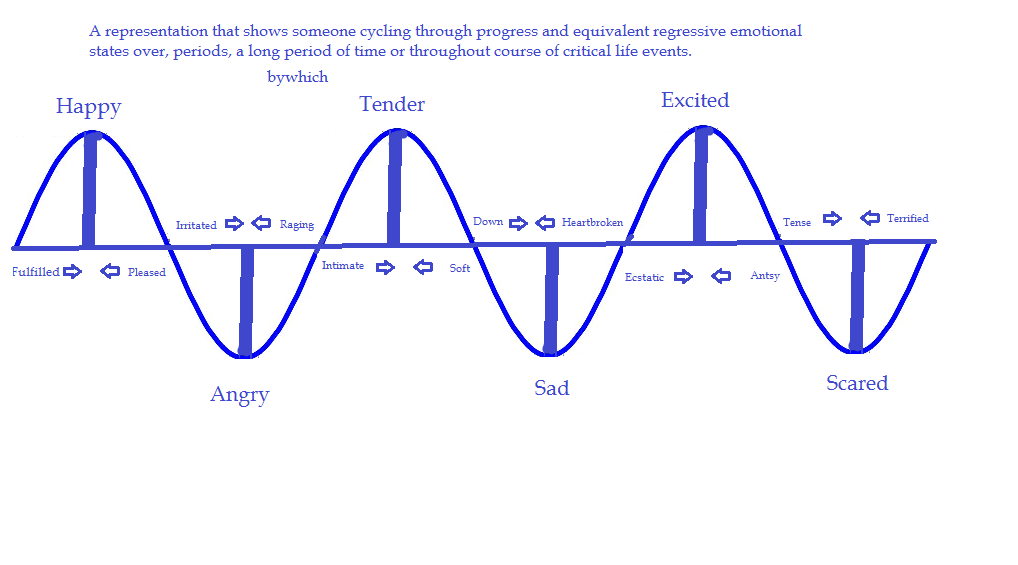|
It is interesting that the English language offers over 3,000 words to describe human emotions. What I think is even more interesting is that someone, who can access the full range and depth of their emotions, will behave differently than someone who cannot in differing circumstances. So many English and other words exist to describe emotions, because the human capacity to feel is actually a spectrum of broad emotional states and micro-emotions. Narrowing the focus to a couple of emotion classifications, or states, and more specified emotions, the following chart can help us understand what emotions an individual can experience. Furthermore, people cycle through these emotional states on a momentary, daily, seasonal, and yearly basis. As such, an even more useful way to understand emotions would be to arrange these various feelings into an actual spectrum where all the micro-emotions can be included. As we cycle through our broad range of emotions, i.e. we progress or regress, it is important to recognize most people experience a narrower range of micro-emotions in each emotional state. In fact, some individuals might experience such a narrow micro-emotional range that their emotional spectrum is more like a discrete set of the emotional states while an even smaller number of people may not even experience a complete set of the fundamental emotional states. This explains why on a regular basis a particular individual, who might be happy one moment, suddenly becomes angry; this person does not experience emotions in-between these states.
As the wave and Gaussian forms suggestion, an individual may cycle through some of the emotional states and micro-emotions more quickly than the other states, i.e. a higher frequency for some states, while the ordering of the states may differ for different people. (I would be very interested to see more research on the subject as developing our understanding of how we cycle through our micro-emotions could help us progress in our emotional health.) A couple of more thoughts on emotions… Individuals cycle through emotions differently. Behavior, including thought behavior, is influenced by circumstance and personality. A person in an unhealthy environment may gravitate toward the sad or angry areas of their spectrum, i.e. exhibit a depressed or violent persona; whereas, their essence may gravitate toward the more happy end of their spectrum. People are motivated economically, i.e. pursuit of self-interests including financial reward, social, and emotional. In many respects, the Cold War era forced Westerners to reject, or at least partially reject, thinking outside of capitalism, i.e. the pursuit of self-interest becomes first, thus the decision-making capacity of Westerners, especially Americans, become more economic and shortsighted in nature. One consequence is that we tend to process information economically (cost versus benefit) and in terms of economics, even when we should be processing thoughts emotional or considering the social impact of our actions. It makes me wonder if this has a lot to do with why people have so much difficulty dealing with their emotions honestly and building healthy relationships. Instead of relationships, which are rooted in emotion, people embrace arrangements built on economic factors like comfort, ease, sexual impulse, and financial benefit in order to fulfill basic emotional and social needs. Looking at how exhausted medical and mental health professionals can become when dealing with severely disturbed individuals on a daily basis over a career, I cannot help but consider how emotionally exhausted children from dysfunctional families or families with disturbed family members must feel. It should be no surprise that most kids from broken, dysfunctional, abusive, and impoverished families cannot function at the same level as their peers from healthy and affluent families, yet it is to most people. Can people be emotionally raped? That is, will someone respond to a severe emotional assault, i.e. someone’s emotions have been manipulated through deceit, in a similar fashion as a rape victim responds to the violation of their body, personal security, and ability to choose. (Of course, this also begs the question of whether or not someone can be socially raped. For example, a disenfranchised woman or an appeaser is socially pressured by her overbearing parents to date or marry someone.) As a commonplace example of potential emotional rape, a manipulative person lies to a person he knows to be emotionally vulnerable in order to get sex. As another example, someone does not want to have romantic feelings for someone else (not because things didn’t work out, but because he knew it would likely not work out, she didn’t love him romantically, he knew he couldn’t handle the rejection, and she wouldn’t try to make it work), but the girl continuously and forcefully uses deceit to convince this person to fall in love with her. Once the deceit is fully realized, though he is still in love with the lie as he struggles to move on, she then attacks him socially when he tries to confront her with the feelings she forced onto him and the hurt she caused, i.e. silence him, in order to protect her social standing and allow herself to continue to move on without regret. Thoroughly violating someone’s ability to choose and confront the cause of their hurt is very traumatic; I think the response to such a violation can very much resemble rape in extreme cases, especially when exasperating factors exist….she touched me here
Comments
Tragic events like the Boston Marathon Bombing leave people to question why the perpetrators of these violent crimes chose to harm others. All choices have economic, emotional, and social consequences to the decision-maker and others. In fact, even the act of making a choice has costs as the decision-making process takes time and effort that takes away from other intellectual endeavors. A preoccupation with emotional or social issues can very much limit the ability of a person to focus on essential intellectual endeavors. When trying to understand individuals in crisis, such as those on the verge of committing a violent act, it is important to understand their state of mind by looking at what costs these individuals do not consider and what costs these individuals are willing to endure over what others typically will not.
For example, someone who is in a critical stage of suicide, i.e. thoughts of suicide have been crystallized into worsening suicidal impulses after decades of suffering, struggle to make the choice to live on a daily basis. The decision to live is based on whether or not such an individual can live with the short-term consequence of a given choice or the day’s events while decision-making becomes ever more dependent upon emotion, even when inappropriate. Unless a critically suicidal person can find a significant enough purpose to live for, such as having a child, an equivalent love of science or meaningful job, he cannot progress beyond this degenerative state. Because of the short-term nature of these individuals’ reactions to life events and ongoing stressors, these individuals may not be able to address their broader and long-term interests, even when they thoroughly understand those needs. Suicidal victims eventually regress to a state where they no longer consider social costs, i.e. the impact of their death on others, and economic costs, i.e. personal interests like finances, as their focus is on the emotional costs associated with continuing to live. Similarly, an individual considering a first act of violence narrows their decision-making capacity to include only a few factors. Instead of recognizing the pain and suffering an act of violence will do to potential victims, or the legal fallout, a would-be attacker might consider the cost of disappointing peers. For Dzhokhar Tsarnaev, the cost of disappointing his brother (social/emotional cost) was likely more “expensive” than the cost of hurting others, being punished criminally, and distressing other family members, if these factors were even considered. For those who have been radicalized, such as Tamerlan Tsamaev, the choice to commit a violent act may depend upon a feeling that the rules of society do not address a critical set of his interests. These individuals feel neglected by our broader society, so the social cost of not acting violently for the approval of a small group of peers is far more costly than the cost of going to prison or being killed. What makes acts like suicide or violent crimes so mystifying to healthy, well-assimilated individuals stems from the ancient Western philosophies that influence modern day thinking. Much of the world has been indoctrinated by Socrates’ assertion that motivation is rooted in the fear of death. Shifted to more modern, accurate terms, motivation is based on an avoidance of discomfort. In ancient Japanese tradition, as an example detached from Western thinking, suicide was seen as an acceptable means of avoiding the discomfort of shame. In a similar fashion, emotionally damaged people use suicide as a means of avoiding emotional pain. In turn, violent criminals use violence to avoid the discomfort associated with having their interests neglected. In other words, they feel a need to “fight back” against what they perceive to be an attack on them by society. If an individual’s decision-making processes have been distorted by an emotional or social deficit, making an economic argument, for example, will have little effect on their actions. As an example, society offers prison time for a violent offense, which is an economic incentive not to commit a crime. Most people make the choice not to cause harm due to the consequences; however, certain violent offenders cannot. FBI and other interrogators have a successful track record with interrogating methods based in efforts to forge relationships with detainees. These methods can be successful, because interrogators recognize and attempt to exploit the emotional and social deficits of their subjects. Like a suicidal individual, a person contemplating a violent crime, including an act of terrorism, may offer a few subtle hints in order to find an “out,” as these people may want to maintain their options, or legitimatize their actions as the only path. For potential terrorists and other outcasts, violent groups, characters, and ideals can fulfill the needs that our broader society has neglected. Where an emotional or social deficit can motivate an act of terrorism or other violent offense, preemptive efforts might be taken to address such emotional and/or social deficits in order to avoid acts of violence. If investigators, who flagged the young man, had an opportunity to steer Tamerlan Tsamaev’s pursuit of his emotional and social deficits into more construction outlets during an interview, they might have been able to motivate him away from terrorism. In short, understanding the decision-making process of those in crisis can help our society both explain and prevent future tragedies. http://usatoday30.usatoday.com/money/smallbusiness/2010-05-25-olderworkers25_CV_N.htm
It makes sense that a growing number of older workers are starting new businesses. Individuals in their late working years tend to have more assets and greater savings, so they possess the capital needed to invest in a business, establish a line of credit for the business, and endure an almost certain period without revenue. They also have experiences that helps guide them as to what products and/or services can turn a profit while their experiences afford them the benefit of having relationships with a potential customer base. Trust and professional recognition are two invaluable commodities in short supply that cannot be bought; they must be earned over time. Older workers enjoy these real benefits, whether as, the youth tend to lack these resources. Perhaps more importantly, older workers looking to start a business have the confidence that comes with a history of financial and professional success. Starting a business due to job loss has become far more common, especially in the wake of the Great Recession. Older workers, who know they have the ability to make money with their skills and experience, have an easier time seeing a clear path to prosperity. A young worker, however, may not be able to see a way forward, especially if this individual has made multiple attempts to find a means of generating revenue after being rejected by employers. Given the Great Recession, this scenario may well be more commonplace than some would like to admit while exasperating factors, such as mental illness or inherited poverty, can leave individuals unable to effectively compete in the economy. Although these factors are largely perceived costs, which motivation might overcome, it is foolish to think a person can have their legs broken then be expected to win the marathon that economy has become. Capitalism is predicated on the idea that effort, which is beneficial to others and/or society as a whole, is rewarded finically via an increase in standard of living, greater financial freedom, and financial security. Young entrepreneurs will tend to quickly exhaust their capital, especially if they cannot temporarily displace costs necessary for their success onto others, such as their parents, and their ability to adjust to failures by finding new directions. In many respects, the idea of older workers leading the charge in business creation is nothing new. In Meadville, PA, which had been known as the tool and die capital of the world, well-paid blue collar workers would establish themselves in a shop, develop some idea, which they conceived while working, then spin off new companies to service the needs of their employers and other surrounding businesses. Today, this cycle of innovation has been short-circuited by a need for greater startup capital thanks to inflation and the focus on capital-intensive, high tech industry, a mismatch of technical and intellectual capital with those who can start a business venture, and a tendency of businesses to incur opportunity costs over training/productivity costs. Opportunity costs are incurred when businesses do not utilize the skills, knowledge, and intellectual capital of employees to purpose new opportunities. In order to control costs, employers seek ready-to-go workers with specialty backgrounds, where the cost of specialized (re)training is continually subsidized by the government or absorbed by the workers, instead of hiring workers with broad-based training such as those educated in the sciences. Locking the right people out of an industry in order to save on training costs, appease labor unions, and/or suppress wages by embracing lower skilled labor is a killer to innovation and industry, especially in a globalized, lowest bidder economy. It is also harmful to high quality employees who cannot get their foot in the door. In short, older workers are needed to be the source of new businesses. With the younger of the two Boston Marathon Bombers in custody and the older brother dead, it is time to ensure these individuals are held accountable for their actions and learn what can be learned from this tragedy. Although our public officials and public protectors performed well in the aftermath of the bombing, the handling of the young suspect and future perpetrators of such violence could get very murky given past oversights introduced by the far right through the George W. Bush Administration. Clearly, national security is far too politically charged as politics pushed the hands of the Obama Administration to classify the massacre as a terrorist attack prematurely. On the right, a strong coalition of influential individuals would have liked to see the young suspect treated as an enemy combatant in order to circumvent his Constitutional rights guaranteed to him as a US citizen. The use of concepts like terrorism, enemy combatant, and weapons of mass destruction offer insight into the wrongheaded thinking of these influential Americans. How words are used matters, especially when they come from the mouths of public officials and influential persons, because the working definition of key concepts determines if we embrace proper, effective policies or simply complicate issues. A terrorist is a criminal and can be a murder; however, a terrorist is more than a criminal as a terrorist acts to intimate society as means of changing public policy through fear. In the vagueness of the legal and working definition of terrorist, a protestor or freedom fighter may be labeled by a government as a terrorist or a supporter of terrorism. Consider that the CIA is regarded by many in the Middle East to be a state-sponsored terrorist organization while the militarized wing of Hamas is not. The reason the definition of terrorism matters is that governments misuse the term to legitimize the abuse of those seeking their freedoms and radical groups misuse the term to manipulate would-be recruits. In events like the Boston Marathon Bombing, the distinction between a murderer and a terrorist is important, because a murder is motivated by different thinking than a terrorist; therefore, the threat of further terrorism must be addressed differently than the ongoing threat of murder. Meanwhile, one of the most damaging aspects of the George W. Bush era was an effort by the far right to circumvent the US Constitution and basic American values concerning human rights. The rise of globalized terrorism tested the fabric of our society by forcing us to recognize the need to balance freedoms with security. Instead of rising to that challenge with our best efforts, our public officials gave into the temptation and ease of engaging in practices like torture and unwarranted detentions. It is these same voices on the right who wish to ignore the young Dzhokhar Tsarnaev’s citizenship and the Constitution to interrogate him as an enemy combatant in Guantanamo Bay. The term enemy combatant has great significance. It implies war, but the use of it in classifying terrorist suspects stretches the definition of war to mean any act of violence against all self-proclaimed US interests. Because war tends to involve a loosening of Civil Rights, an ill-defined perpetual war is a threat to our freedoms and values. Furthermore, Dzhokhar Tsarnaev is charged with the use of a weapon of mass destruction, among other criminal offenses. The concept of a weapon of mass destruction was originally introduced as a classification for chemical, biological, and nuclear weapons. The entire point of using the term “weapons of mass destruction” was to alert public officials and the general public to the enhanced treat that they present. In turn, laws were supposed to created and action taken to deal with the increasing threat of WMDs. Quite frankly, the threat posed by something that can be made from horse shit, i.e. a fertilizer bomb, is not the same threat posed by a nuclear weapon. Creating a legal standard that treats someone, who sets off a conventional explosive, which is admittedly terrible destructive, in a similar manner as someone trying to build a chemical or biological weapon at home lessens the significance of the charge. Laws had already been written to punish people for bombings; the laws against the use of WMDs needed to exist in order to offer an enhanced punishment for using an actual weapon of mass destruction. Perhaps more importantly, the broadened use of the term WMD paves the way for human rights violations, i.e. the death penalty could be expanded to crimes that would otherwise not result in the death penalty. If someone uses an explosive as a weapon with the same potential to cause harm as a gun, equal treatment under the Fourteen Amendment demands a near equivalent punishment. Should an individual or business accidently kill someone in an explosion, such as the one in West, Texas, any intentional wrongdoing could translate into a death sentence under the WMD classification when a lethal car accident caused by drunk driver would result in a far less punishment. We must also ask whether it is reasonable to subject a child to the WMD charge for using a cherry bomb on a mail box. Moreover, the reason the misuse of these concepts matters is that these situations will play out at some point while our legal system needs to be consistent. After all, the justice system only has value to society, because it promotes order through equal treatment. Just as sneak-and-peak searches under the Patriot Act were used for drug enforcement when they were intended to be limited to investigations into terrorist threats, the increasing misuse of concepts like terrorist, enemy combatant, and weapons of mass destruction is certain to undermine public policy and our civil rights. Instead of addressing key questions on how to deal with terrorism, the US government has far too often chosen to avoid finding a means of balancing security with freedoms. Just a thought… Because George W. Bush and his Administration view terrorism as antifreedom; they viewed any means of stopping it to be profreedom. Although he and his political allies might agree torture is bad, the use of the practice is completely justified in their minds as they still believe it helps fight the threat of terrorism. Similarly, Al Qaeda operatives and other violent criminal actors view America to be a violator of their righteous and cultural practices, i.e. we deny them freedom. Such individuals may believe killing, including killing Americans, is wrong, yet they also view violence as a legitimate means of fighting US oppression. (Attacks on civilians are further legitimized as the US is a democracy and the government is supposedly beholden to the People.) The infamous Guantanamo Bay detention center continues to generate one problem after another for the US military. While hunger strikes have long plagued the facility, the practice has been taken to a whole new level of unhealthy in recent months with over half of the detainees refusing to eat. Although the military recognizes the detainees have a right to protest, their policy is to use a feeding tube to force-feed any individual who is in a critical stage of starvation. Several human rights groups consider the intervention a violation of the detainee’s human rights. That is, the practice violates a person’s right to be treated humanely, i.e. the feeding tube cases undue discomfort, right to self-determination, and right to protest.
Ironically, these same groups would probably accuse the US military of violating human rights, if they allowed these detainees to simply die as doing so would be an indication of intentional neglect/mistreat of detainees. That said, the right to self-determination and the right to protest are human rights; however, these rights are severely truncated for these individual due to the fact they are imprisoned. Legitimately imprisoned individuals forfeit their right to self-determination while their right to protest is only limited to activities undertaken to ensure their human and civil rights are respected by their caretakers. Meanwhile, it is important to remember suicide is illegal and the US government does intervene to prevent the suicide of free individuals all the time, by force if necessary. Unfortunately, it is questionable as to whether or not these detainees are being held legitimately. Not only is the term enemy competent loosely defined and applied inconsistently, i.e. those being held as enemy combatants have not been formally charged with crimes, have not been given a adequate opportunity to review or protest the validity of even basic evidence, or been freed when they have been legally guaranteed their freedom. Certainly, foreigners do not have Constitutional rights, but the world standing and moral character of the United States is deeply rooted in justice, human rights, and freedom from arbitrary imprison for all. As such, the US needs to do more to bring Guantanamo Bay away from the practices that pushed our Forefathers to found our Nation by embracing the principles that all Americans are supposed to espouse. In short, the ethical concerns of using feeding tubes is somewhat superficial as the real ethical violation is whether or not these individuals are beginning illegitimately held by the United States government. |
Read old posts
April 2020
|





 RSS Feed
RSS Feed
